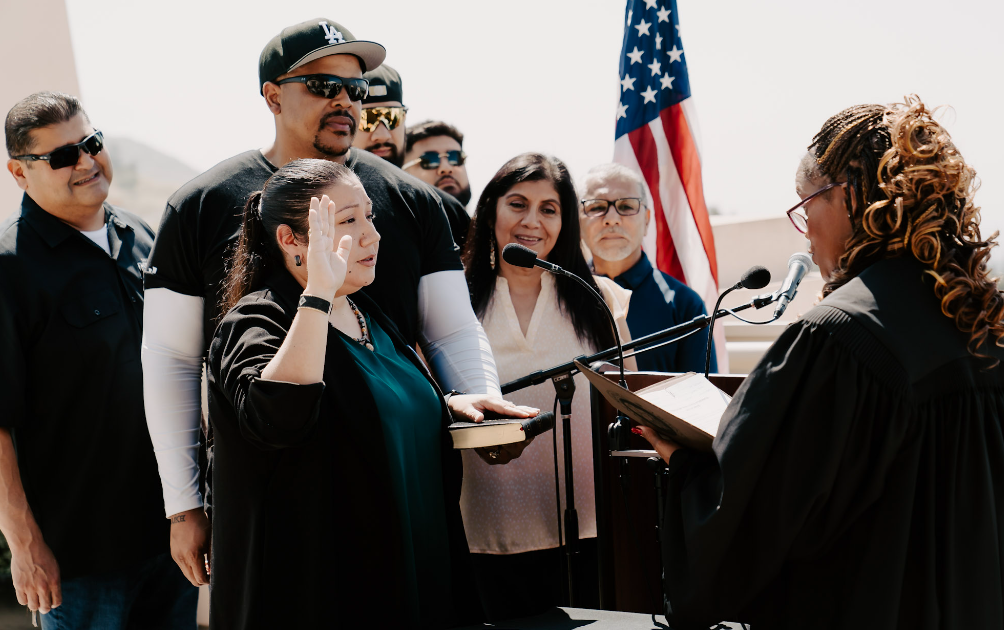By Antonio? ?Ray? ?Harvey? ?|? ?California? ?Black? ?Media?
The California African American Chamber of Commerce partnered with the California African American Action Fund to host its annual “Honorable Gwen Moore California Legislative Reception.” The event took place on May 7 at the Sutter Club in downtown Sacramento.
Distinguished guests included business leaders, state officials, and both former and current lawmakers. Notably, members of the California Legislative Black Caucus (CLBC), attended the event. Former Assembly Speaker and San Francisco Mayor Willie Brown, 90, was the keynote speaker. Former state Sen. Roderick Wright and CAACC Executive Director Timothy Alan Simon served as emcees.
“The California African American Chamber of Commerce and the California African American Action Fund represent the African American economy of the fourth largest economy of the world,” Simon said during the introduction of the event. “Therefore, tonight let’s have some fun. We are going to learn how to acquire more power, more financial funding, and more access. We’re opening up those doors to you.”
During the reception, an award ceremony honored individuals for their achievements, innovative ideas, leadership, business acumen, and political contributions.
The CAACC Media and Communications Award was presented to Civil Rights Activist Danny Bakewell Jr., President of the Bakewell Company, and Executive Editor of the Los Angeles Sentinel.
The Gwen Moore Legislative Impact Award was presented to Assemblymember Lori Wilson (D-Suisun City), Chair of the CLBC. The Legislator of the Year honor went to Assemblymember Corey Jackson (D-Moreno Valley).
“This is an absolute honor. Especially, with my knowledge and familiarity with Assemblymember Moore’s work,” Wilson said. “It’s just a reminder, honor, and privilege of this space I get to be in. This award holds profound significance for me and those who dedicated their lives to advancing equity, justice, and opportunities for all.”
Cathy Adams, President and CEO of Oakland African American Chamber of Commerce was presented with the Aubry Stone Outstanding Business Award. The Trailblazer Award was presented to the late Linda Crayton, former San Francisco City Commissioner.
Crayton served on the Airport Commission for the City and County of San Francisco from 1996 to 2020.
“She clearly served for almost 25 years, and she was totally sensitive to the need and careful implementation within the framework of all the rules that had been established,” Brown said of Crayton. She was a difference for many.”
Other leaders honored were John Reynolds, California Public Utilities Commission (recipient of the Distinguished Service Award); Hon. Heather Hutt, Councilmember for the City of Los Angeles, representing Council District 10, (Distinguished Service in the African American Community Award); and Thurman White, Senior Advisor ESO Ventures (Distinguished Recognition Award).
Rounding out the special guests and awardees list were Sen. Steven Bradford (D-Gardena), CLBC Vice Chair, Dennis Thurston, Supplier Diversity Program Manager for Southern California Edison; Angela Gibson-Shaw, President of Greater Los Angeles African American Chamber of Commerce; and Tommy Ross, Pinnacle Strategic Group.
Toks Omishakin, Secretary of the California State Transportation Agency (CALSTA) also attended the two-hour event.
The California African American Chamber of Commerce is one of the state’s largest statewide Black Chamber organizations. Its mission is to drive economic opportunity and wealth creation for African American businesses and connect and harness the collective strength of our statewide network of member organizations to elevate fiscal health.
Moore was elected and first served on the Los Angeles Community College District Board in 1975. She was first elected to the state legislature in 1978 and served for 16 years until 1994, representing California’s 49th district (redistricted and renumbered in 1990 as the 47th district), which currently includes Long Beach, Catalina Island, and parts of Los Angeles and Orange counties.
When Brown was elected to be the Speaker of the Assembly, he appointed Moore the Chairperson of the Assembly Committee on Utilities and Commerce. The position held legislative jurisdiction over telecommunications, electricity, private water corporations, natural gas, and other issues related to exchanging goods and services between businesses.
Moore passed away in August 2020.
“Her job was done in such a way that when she left the halls of legislation in 1994 the public utility world reached out to get her guidance and judgment in the process of decisions that would be made,” Brown said. “That’s the nature of how we need to work in the world of politics and, how we need to exercise authority and privilege.”
 Westside Story Newspaper – Online The News of The Empire – Sharing the Quest for Excellence
Westside Story Newspaper – Online The News of The Empire – Sharing the Quest for Excellence

